Strategic Management and its Subjectivity to Neoliberalism and Military History
VerifiedAdded on 2023/04/25
|6
|1376
|311
AI Summary
This essay evaluates the significant ways that neo-liberalism and military history have been subjective to strategic management. It discusses the implementation of military terminology in modern management, the importance of strategy, and the political implications of globalization strategies.
Contribute Materials
Your contribution can guide someone’s learning journey. Share your
documents today.
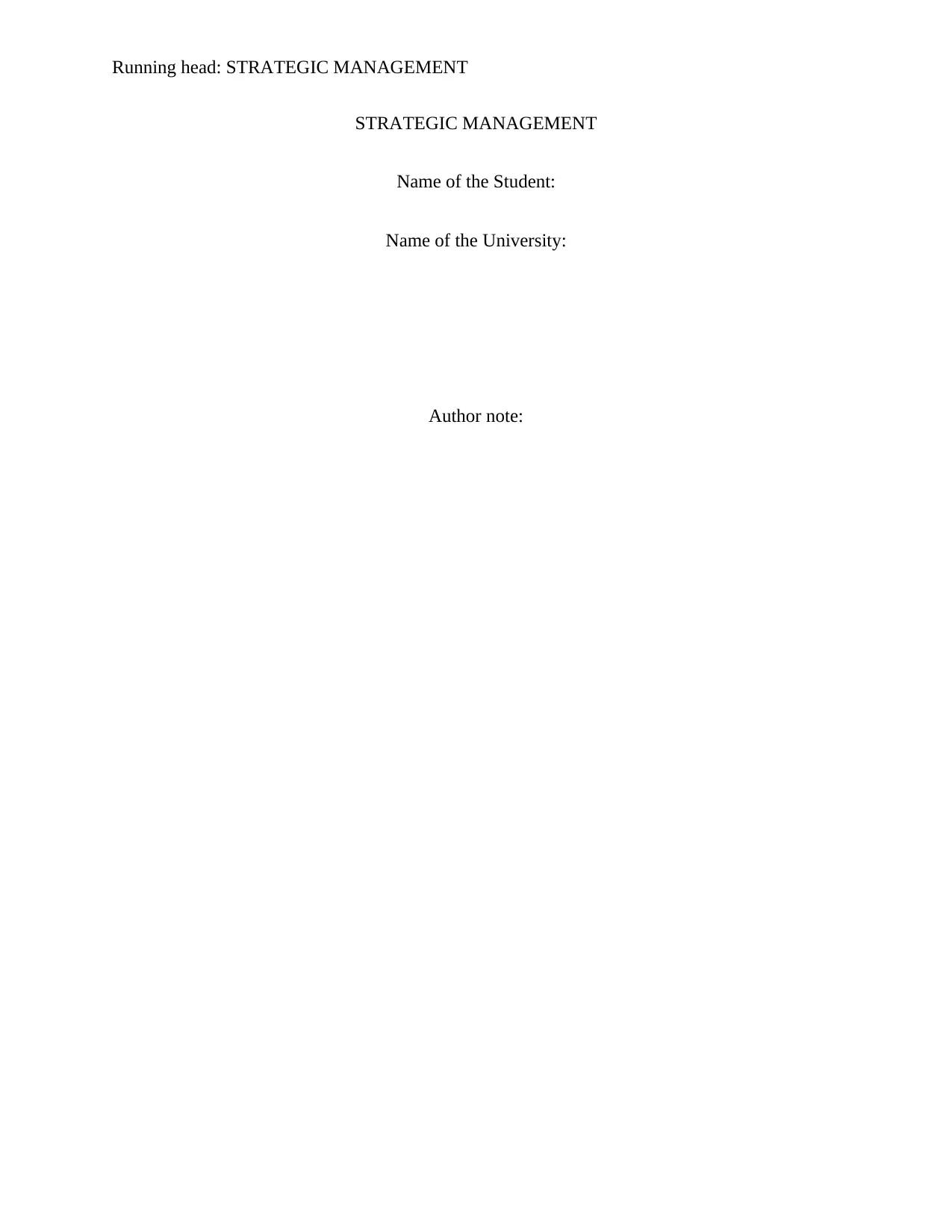
Running head: STRATEGIC MANAGEMENT
STRATEGIC MANAGEMENT
Name of the Student:
Name of the University:
Author note:
STRATEGIC MANAGEMENT
Name of the Student:
Name of the University:
Author note:
Secure Best Marks with AI Grader
Need help grading? Try our AI Grader for instant feedback on your assignments.
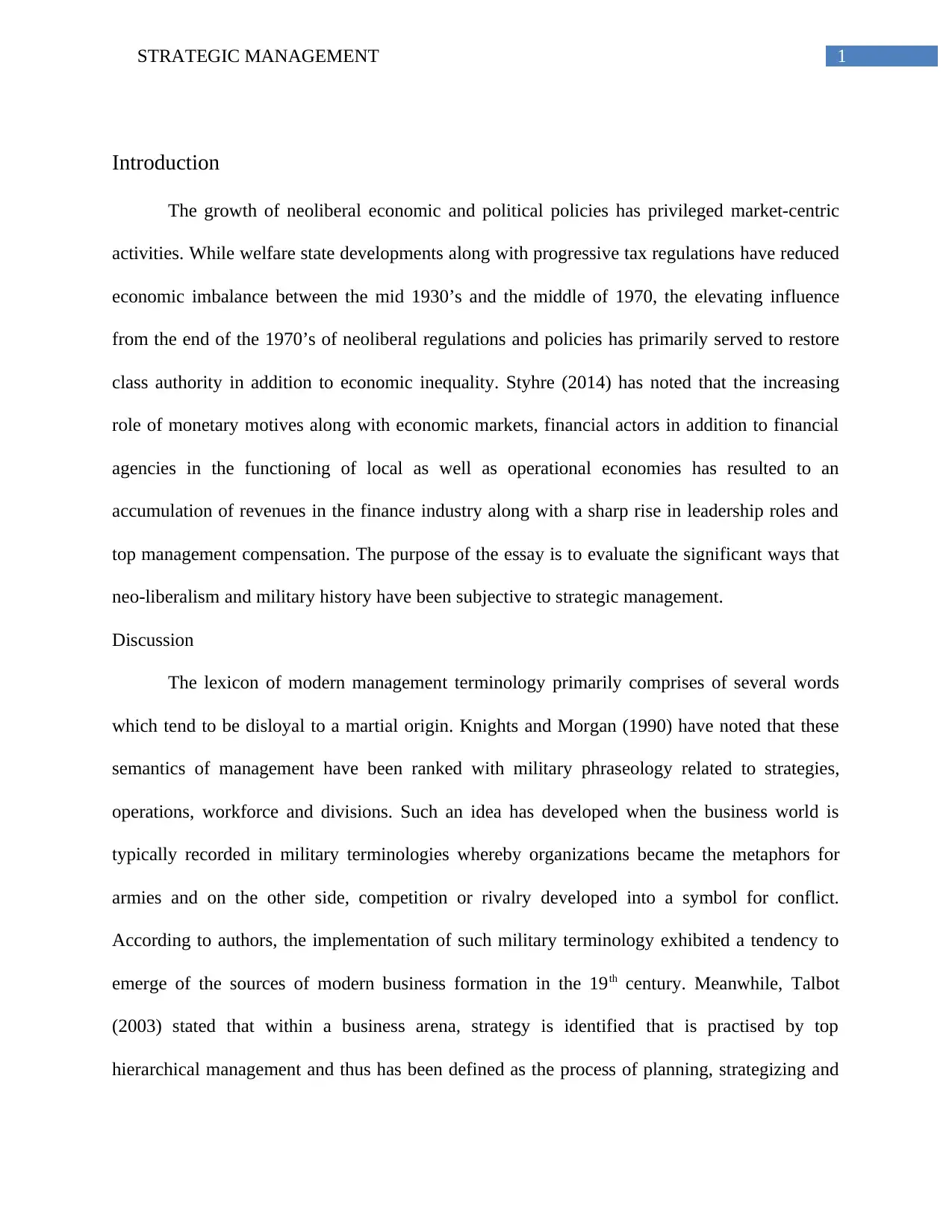
1STRATEGIC MANAGEMENT
Introduction
The growth of neoliberal economic and political policies has privileged market-centric
activities. While welfare state developments along with progressive tax regulations have reduced
economic imbalance between the mid 1930’s and the middle of 1970, the elevating influence
from the end of the 1970’s of neoliberal regulations and policies has primarily served to restore
class authority in addition to economic inequality. Styhre (2014) has noted that the increasing
role of monetary motives along with economic markets, financial actors in addition to financial
agencies in the functioning of local as well as operational economies has resulted to an
accumulation of revenues in the finance industry along with a sharp rise in leadership roles and
top management compensation. The purpose of the essay is to evaluate the significant ways that
neo-liberalism and military history have been subjective to strategic management.
Discussion
The lexicon of modern management terminology primarily comprises of several words
which tend to be disloyal to a martial origin. Knights and Morgan (1990) have noted that these
semantics of management have been ranked with military phraseology related to strategies,
operations, workforce and divisions. Such an idea has developed when the business world is
typically recorded in military terminologies whereby organizations became the metaphors for
armies and on the other side, competition or rivalry developed into a symbol for conflict.
According to authors, the implementation of such military terminology exhibited a tendency to
emerge of the sources of modern business formation in the 19th century. Meanwhile, Talbot
(2003) stated that within a business arena, strategy is identified that is practised by top
hierarchical management and thus has been defined as the process of planning, strategizing and
Introduction
The growth of neoliberal economic and political policies has privileged market-centric
activities. While welfare state developments along with progressive tax regulations have reduced
economic imbalance between the mid 1930’s and the middle of 1970, the elevating influence
from the end of the 1970’s of neoliberal regulations and policies has primarily served to restore
class authority in addition to economic inequality. Styhre (2014) has noted that the increasing
role of monetary motives along with economic markets, financial actors in addition to financial
agencies in the functioning of local as well as operational economies has resulted to an
accumulation of revenues in the finance industry along with a sharp rise in leadership roles and
top management compensation. The purpose of the essay is to evaluate the significant ways that
neo-liberalism and military history have been subjective to strategic management.
Discussion
The lexicon of modern management terminology primarily comprises of several words
which tend to be disloyal to a martial origin. Knights and Morgan (1990) have noted that these
semantics of management have been ranked with military phraseology related to strategies,
operations, workforce and divisions. Such an idea has developed when the business world is
typically recorded in military terminologies whereby organizations became the metaphors for
armies and on the other side, competition or rivalry developed into a symbol for conflict.
According to authors, the implementation of such military terminology exhibited a tendency to
emerge of the sources of modern business formation in the 19th century. Meanwhile, Talbot
(2003) stated that within a business arena, strategy is identified that is practised by top
hierarchical management and thus has been defined as the process of planning, strategizing and
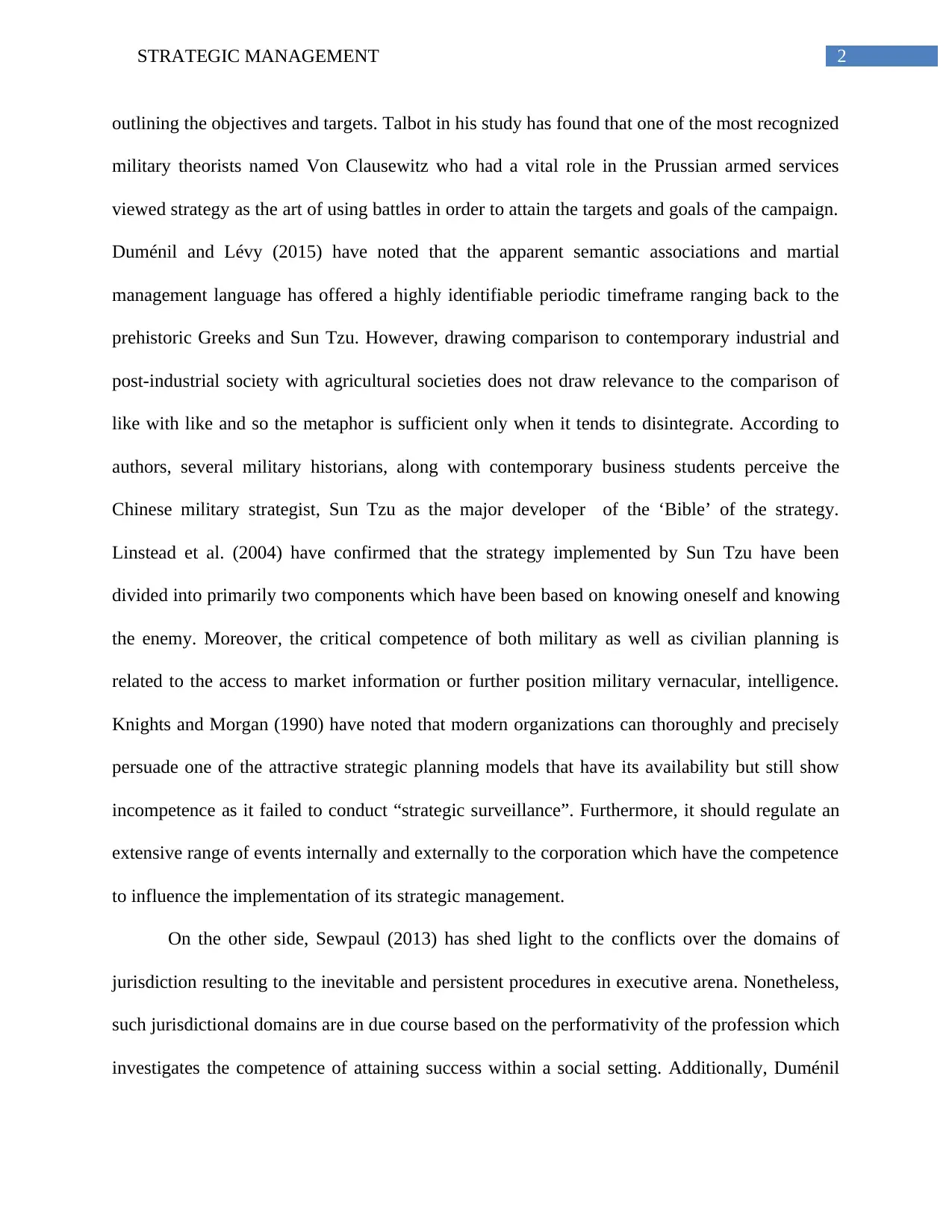
2STRATEGIC MANAGEMENT
outlining the objectives and targets. Talbot in his study has found that one of the most recognized
military theorists named Von Clausewitz who had a vital role in the Prussian armed services
viewed strategy as the art of using battles in order to attain the targets and goals of the campaign.
Duménil and Lévy (2015) have noted that the apparent semantic associations and martial
management language has offered a highly identifiable periodic timeframe ranging back to the
prehistoric Greeks and Sun Tzu. However, drawing comparison to contemporary industrial and
post-industrial society with agricultural societies does not draw relevance to the comparison of
like with like and so the metaphor is sufficient only when it tends to disintegrate. According to
authors, several military historians, along with contemporary business students perceive the
Chinese military strategist, Sun Tzu as the major developer of the ‘Bible’ of the strategy.
Linstead et al. (2004) have confirmed that the strategy implemented by Sun Tzu have been
divided into primarily two components which have been based on knowing oneself and knowing
the enemy. Moreover, the critical competence of both military as well as civilian planning is
related to the access to market information or further position military vernacular, intelligence.
Knights and Morgan (1990) have noted that modern organizations can thoroughly and precisely
persuade one of the attractive strategic planning models that have its availability but still show
incompetence as it failed to conduct “strategic surveillance”. Furthermore, it should regulate an
extensive range of events internally and externally to the corporation which have the competence
to influence the implementation of its strategic management.
On the other side, Sewpaul (2013) has shed light to the conflicts over the domains of
jurisdiction resulting to the inevitable and persistent procedures in executive arena. Nonetheless,
such jurisdictional domains are in due course based on the performativity of the profession which
investigates the competence of attaining success within a social setting. Additionally, Duménil
outlining the objectives and targets. Talbot in his study has found that one of the most recognized
military theorists named Von Clausewitz who had a vital role in the Prussian armed services
viewed strategy as the art of using battles in order to attain the targets and goals of the campaign.
Duménil and Lévy (2015) have noted that the apparent semantic associations and martial
management language has offered a highly identifiable periodic timeframe ranging back to the
prehistoric Greeks and Sun Tzu. However, drawing comparison to contemporary industrial and
post-industrial society with agricultural societies does not draw relevance to the comparison of
like with like and so the metaphor is sufficient only when it tends to disintegrate. According to
authors, several military historians, along with contemporary business students perceive the
Chinese military strategist, Sun Tzu as the major developer of the ‘Bible’ of the strategy.
Linstead et al. (2004) have confirmed that the strategy implemented by Sun Tzu have been
divided into primarily two components which have been based on knowing oneself and knowing
the enemy. Moreover, the critical competence of both military as well as civilian planning is
related to the access to market information or further position military vernacular, intelligence.
Knights and Morgan (1990) have noted that modern organizations can thoroughly and precisely
persuade one of the attractive strategic planning models that have its availability but still show
incompetence as it failed to conduct “strategic surveillance”. Furthermore, it should regulate an
extensive range of events internally and externally to the corporation which have the competence
to influence the implementation of its strategic management.
On the other side, Sewpaul (2013) has shed light to the conflicts over the domains of
jurisdiction resulting to the inevitable and persistent procedures in executive arena. Nonetheless,
such jurisdictional domains are in due course based on the performativity of the profession which
investigates the competence of attaining success within a social setting. Additionally, Duménil
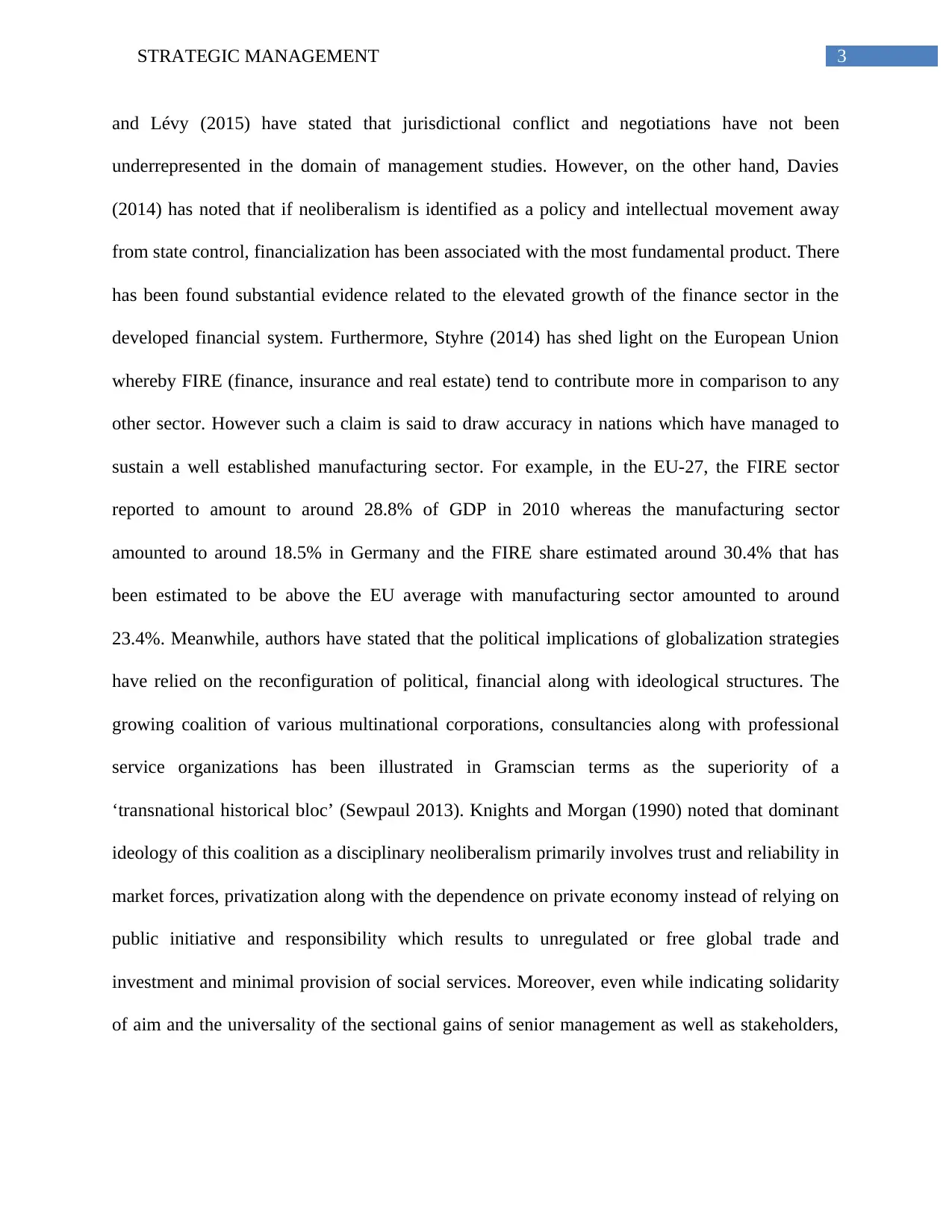
3STRATEGIC MANAGEMENT
and Lévy (2015) have stated that jurisdictional conflict and negotiations have not been
underrepresented in the domain of management studies. However, on the other hand, Davies
(2014) has noted that if neoliberalism is identified as a policy and intellectual movement away
from state control, financialization has been associated with the most fundamental product. There
has been found substantial evidence related to the elevated growth of the finance sector in the
developed financial system. Furthermore, Styhre (2014) has shed light on the European Union
whereby FIRE (finance, insurance and real estate) tend to contribute more in comparison to any
other sector. However such a claim is said to draw accuracy in nations which have managed to
sustain a well established manufacturing sector. For example, in the EU-27, the FIRE sector
reported to amount to around 28.8% of GDP in 2010 whereas the manufacturing sector
amounted to around 18.5% in Germany and the FIRE share estimated around 30.4% that has
been estimated to be above the EU average with manufacturing sector amounted to around
23.4%. Meanwhile, authors have stated that the political implications of globalization strategies
have relied on the reconfiguration of political, financial along with ideological structures. The
growing coalition of various multinational corporations, consultancies along with professional
service organizations has been illustrated in Gramscian terms as the superiority of a
‘transnational historical bloc’ (Sewpaul 2013). Knights and Morgan (1990) noted that dominant
ideology of this coalition as a disciplinary neoliberalism primarily involves trust and reliability in
market forces, privatization along with the dependence on private economy instead of relying on
public initiative and responsibility which results to unregulated or free global trade and
investment and minimal provision of social services. Moreover, even while indicating solidarity
of aim and the universality of the sectional gains of senior management as well as stakeholders,
and Lévy (2015) have stated that jurisdictional conflict and negotiations have not been
underrepresented in the domain of management studies. However, on the other hand, Davies
(2014) has noted that if neoliberalism is identified as a policy and intellectual movement away
from state control, financialization has been associated with the most fundamental product. There
has been found substantial evidence related to the elevated growth of the finance sector in the
developed financial system. Furthermore, Styhre (2014) has shed light on the European Union
whereby FIRE (finance, insurance and real estate) tend to contribute more in comparison to any
other sector. However such a claim is said to draw accuracy in nations which have managed to
sustain a well established manufacturing sector. For example, in the EU-27, the FIRE sector
reported to amount to around 28.8% of GDP in 2010 whereas the manufacturing sector
amounted to around 18.5% in Germany and the FIRE share estimated around 30.4% that has
been estimated to be above the EU average with manufacturing sector amounted to around
23.4%. Meanwhile, authors have stated that the political implications of globalization strategies
have relied on the reconfiguration of political, financial along with ideological structures. The
growing coalition of various multinational corporations, consultancies along with professional
service organizations has been illustrated in Gramscian terms as the superiority of a
‘transnational historical bloc’ (Sewpaul 2013). Knights and Morgan (1990) noted that dominant
ideology of this coalition as a disciplinary neoliberalism primarily involves trust and reliability in
market forces, privatization along with the dependence on private economy instead of relying on
public initiative and responsibility which results to unregulated or free global trade and
investment and minimal provision of social services. Moreover, even while indicating solidarity
of aim and the universality of the sectional gains of senior management as well as stakeholders,
Secure Best Marks with AI Grader
Need help grading? Try our AI Grader for instant feedback on your assignments.
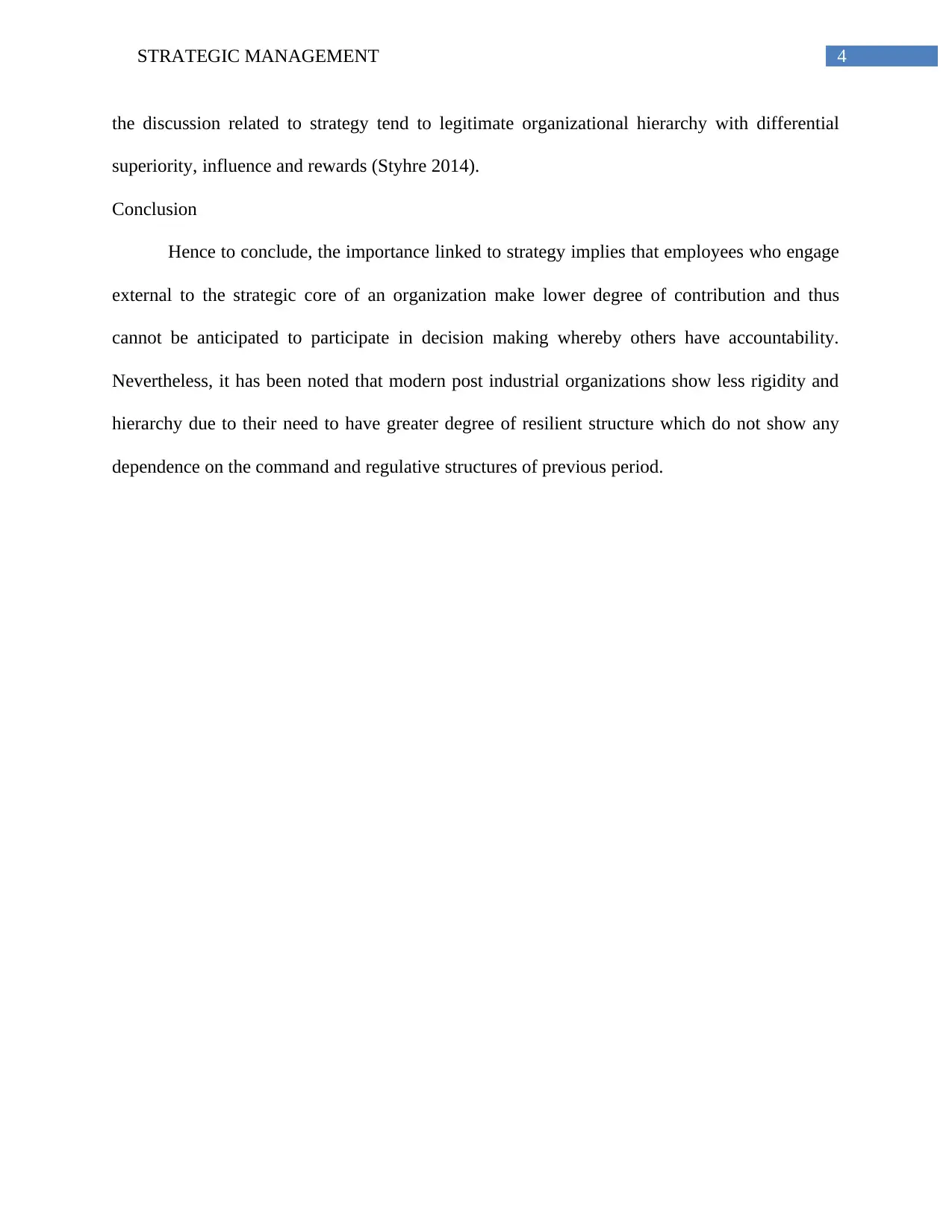
4STRATEGIC MANAGEMENT
the discussion related to strategy tend to legitimate organizational hierarchy with differential
superiority, influence and rewards (Styhre 2014).
Conclusion
Hence to conclude, the importance linked to strategy implies that employees who engage
external to the strategic core of an organization make lower degree of contribution and thus
cannot be anticipated to participate in decision making whereby others have accountability.
Nevertheless, it has been noted that modern post industrial organizations show less rigidity and
hierarchy due to their need to have greater degree of resilient structure which do not show any
dependence on the command and regulative structures of previous period.
the discussion related to strategy tend to legitimate organizational hierarchy with differential
superiority, influence and rewards (Styhre 2014).
Conclusion
Hence to conclude, the importance linked to strategy implies that employees who engage
external to the strategic core of an organization make lower degree of contribution and thus
cannot be anticipated to participate in decision making whereby others have accountability.
Nevertheless, it has been noted that modern post industrial organizations show less rigidity and
hierarchy due to their need to have greater degree of resilient structure which do not show any
dependence on the command and regulative structures of previous period.
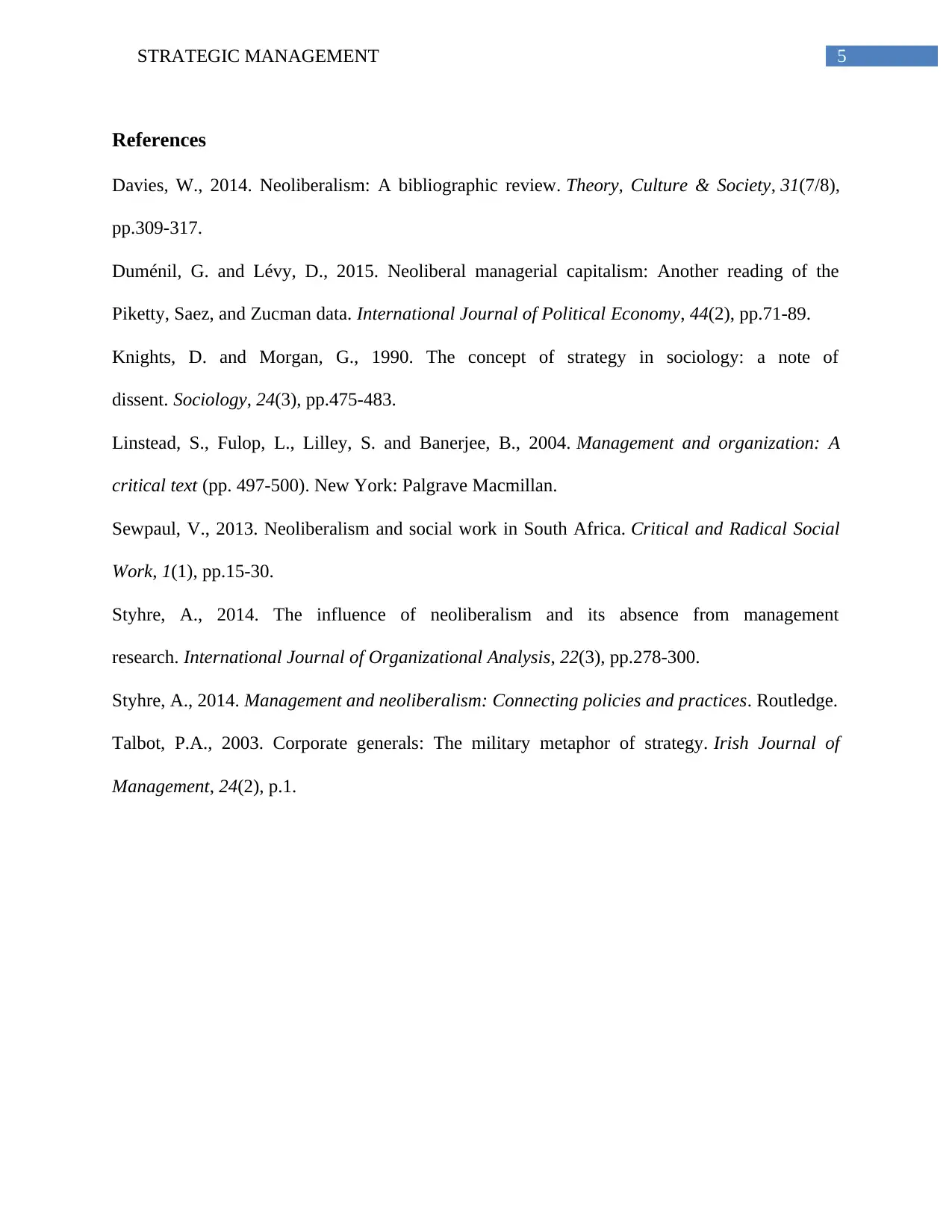
5STRATEGIC MANAGEMENT
References
Davies, W., 2014. Neoliberalism: A bibliographic review. Theory, Culture & Society, 31(7/8),
pp.309-317.
Duménil, G. and Lévy, D., 2015. Neoliberal managerial capitalism: Another reading of the
Piketty, Saez, and Zucman data. International Journal of Political Economy, 44(2), pp.71-89.
Knights, D. and Morgan, G., 1990. The concept of strategy in sociology: a note of
dissent. Sociology, 24(3), pp.475-483.
Linstead, S., Fulop, L., Lilley, S. and Banerjee, B., 2004. Management and organization: A
critical text (pp. 497-500). New York: Palgrave Macmillan.
Sewpaul, V., 2013. Neoliberalism and social work in South Africa. Critical and Radical Social
Work, 1(1), pp.15-30.
Styhre, A., 2014. The influence of neoliberalism and its absence from management
research. International Journal of Organizational Analysis, 22(3), pp.278-300.
Styhre, A., 2014. Management and neoliberalism: Connecting policies and practices. Routledge.
Talbot, P.A., 2003. Corporate generals: The military metaphor of strategy. Irish Journal of
Management, 24(2), p.1.
References
Davies, W., 2014. Neoliberalism: A bibliographic review. Theory, Culture & Society, 31(7/8),
pp.309-317.
Duménil, G. and Lévy, D., 2015. Neoliberal managerial capitalism: Another reading of the
Piketty, Saez, and Zucman data. International Journal of Political Economy, 44(2), pp.71-89.
Knights, D. and Morgan, G., 1990. The concept of strategy in sociology: a note of
dissent. Sociology, 24(3), pp.475-483.
Linstead, S., Fulop, L., Lilley, S. and Banerjee, B., 2004. Management and organization: A
critical text (pp. 497-500). New York: Palgrave Macmillan.
Sewpaul, V., 2013. Neoliberalism and social work in South Africa. Critical and Radical Social
Work, 1(1), pp.15-30.
Styhre, A., 2014. The influence of neoliberalism and its absence from management
research. International Journal of Organizational Analysis, 22(3), pp.278-300.
Styhre, A., 2014. Management and neoliberalism: Connecting policies and practices. Routledge.
Talbot, P.A., 2003. Corporate generals: The military metaphor of strategy. Irish Journal of
Management, 24(2), p.1.
1 out of 6
Related Documents
Your All-in-One AI-Powered Toolkit for Academic Success.
+13062052269
info@desklib.com
Available 24*7 on WhatsApp / Email
![[object Object]](/_next/static/media/star-bottom.7253800d.svg)
Unlock your academic potential
© 2024 | Zucol Services PVT LTD | All rights reserved.




